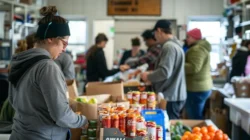Vice President for Student Affairs Juan Gonzalez was speaking at a staff meeting when he heard the news about terrorist attacks against the United States. Darryl Harrison, the Associate Director of the Department of Public Safety, took him aside to tell him what was happening.
“I don’t understand what you’re telling me,” Gonzalez said to Harrison. “Tell me again.”
Before the news had time to sink in, Gonzalez said he fought back tears as he announced the attack to staff members.
Immense tragedies are difficult to comprehend. Minds battle to make sense of emotions that can never be articulated satisfactorily. Without personal stories, thousands of deaths risk becoming a statistic.
Tara Speisman, a first-year Georgetown student, is one of the University community who lost a family member in Tuesday’s attack. Robert Speisman, 49, was visiting Georgetown en route to Los Angeles for a business meeting. His American Airlines flight left Dulles and crashed into the Pentagon. As a husband and father of three, Speisman calls her father “the most enthusiastic and optimistic man imaginable.” She said his commitment to his family was unfathomable and his compassion for others was equally strong.
“I am in a state of shock,” Speisman said. “I feel as though I am in a horrible nightmare, and I am waiting to wake up.”
Tara traveled home and is not sure when she plans to return to Georgetown. She said the support she has received from the students, professors and staff has been very helpful.
“The only thing I would ask of the Georgetown community is that they continue to show their support and that they keep my family in their thoughts,” Speisman said. “It is very encouraging to hear from others and to know that I am not alone.”
All people deal with tragic events in their own ways, but most people follow a similar progression of feelings.
“The initial reaction is almost invariably a state of shock-a time in which we feel numb and overwhelmed,” Paul Steinberg, M.D., a counselor with Counseling and Pyschiactric Services, wrote in a letter to students. “Commonly, we find ourselves saying, ‘This cannot be happening; this could not have happened.’”
Steinberg said that shock can rapidly give way to feelings of despair, rage, and helplessness. During difficult times, “even the most committed atheists and agnostics may pray … ” he said.
According to Steinberg, eventually people are able to integrate seemingly overwhelming events into their world view. The brain adapts, and we are better able to handle problems in the future.
Throughout the day Tuesday, University President John J. DeGioia met with top administrators every two hours to discuss recent updates and possible plans of reaction. Ryan DuBose (CAS ‘02) and Brian Walsh (CAS ‘02), the president and vice-president of the Georgetown University Student Association, joined three of these meetings to discuss student response.
In response to the attacks, William Tucker, Director of Public Safety, enacted a plan to heighten safety on campus. All vehicular traffic coming into the University was cut off, excluding food deliveries and those who could show Georgetown identification. As of Wednesday, vehicular traffic is permitted from 7 a.m. to 7 p.m. Outside of those times, DPS is registering all incoming vehicles and checking for Georgetown identification. In addition, DPS officers at each campus entrance ask pedestrians for identification and are on 12-hour shifts.
After the plane crashed, buildings and organizations around the District received all kinds of threats. George Washington University, for example, received two bomb threats Tuesday. According to Tucker, the Metropolitan Police Department does not believe there are any significant threats west of Wisconsin Avenue. Julie Green Bataille, Assistant Vice President of Communications also confirmed that she is not aware of any threat to the Georgetown campus.
Tucker said all precautions taken in response to Tuesday’s attacks are all part of a previously drafted emergency response plan.
D.C. Mayor Anthony Williams has declared a state of public emergency in the District until midnight on Sept. 26. Until then, 11 government departments, including MPD and Fire and Emergency Medical Services Department must coordinate efforts to protect public health, safety and welfare in D.C.
Georgetown University Hospital is sponsoring three blood drives in the Leavey Center on Sept. 14, 21 and 28.
Charles Tartaglia, M.D., Director of CAPS, said that Georgetown University’s response to the attacks followed guidelines for dealing with tragedy. He said that following those guidelines, which include listening carefully, keeping people together and taking measures to assure safety, was almost instinctive.
“These things are empirical,” Tartaglia said. “We know these things are helpful for people. Why it’s helpful is speculative, but we know they make the majority of people feel better.”
Green Bataille said that when she found out about the attacks on the Pentagon and the World Trade Center, she had similar feelings as when she heard about the Oklahoma City Bombing.
“It’s always difficult to separate personal emotions and the ability to grasp the situation?how you might be impacted, how to do your job and how to maintain professional composure. I am amazed at the ability people demonstrated to do this on the campus. It demonstrated how much people care for one another.”
American Airlines Flight 77 was also carrying Leslie Whittington, an associate professor of public policy at Georgetown University. Whittington, her husband, Charles Falkenberg, and their two girls, Zoe and Dana, were en route to Australia where Whittington was going to begin a visiting professorship.
Alex Whittington (SFS ‘03), Leslie’s half-brother, described his sister as amazing, her husband as an incredible person and their two daughters as full of happiness and vigor.
When he first heard the news of Tuesday’s attack he did not know his sister and family were involved.
“I’m still in shock,” Alex said. “I can tell you that I personally feel both anger and sadness today.”





